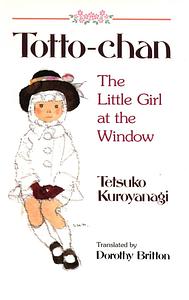You need to sign in or sign up before continuing.
Take a photo of a barcode or cover
adventurous
emotional
funny
hopeful
informative
inspiring
lighthearted
reflective
relaxing
fast-paced
This book was recommended to me by a friend, thank you for that!
Totto-chan is about the authors school life as a young child at an idyllic school in Tokyo. It takes place during WOII but only at the end of the book does this really become noticeable (Tetsuko was a small child at the time after all). Most of the book is very happy, idyllic and some how reminds me of the Little House series, it has the same kind of vibe, of a lovely care free childhood.
The school is amazing. Very free and a safe and encouraging environment. The school doesn't consist of normal buildings, the classes all take place in old train carts. How cool is that? The students do lots of cool activities and are taught many valuable lessons. It seems like an amazing place, more schools should be like that.
The endis very very sad though. Eventually the war does catch up with the students and the school burns down, and is never rebuilt. It's sad that the lives of these children is changed so much because of the war and that the lovely place they felt safe is suddenly gone. It is of course the harsh reality of war, but that doesn't make it less sad. (not sure how spoilerish this really is, because even if it is just a tiny bit at the end of the book, every single thing I read about the book mentions it, but still putting it under the spoiler tag just in case).
Most of the book is just a light hatred book about a lovely school in Tokyo but the end really makes it into more than just that. I wish I would have known about this book as a kid because I'm sure I would have loved it when I was younger (as I do now, reading it as an adult).
Totto-chan is about the authors school life as a young child at an idyllic school in Tokyo. It takes place during WOII but only at the end of the book does this really become noticeable (Tetsuko was a small child at the time after all). Most of the book is very happy, idyllic and some how reminds me of the Little House series, it has the same kind of vibe, of a lovely care free childhood.
The school is amazing. Very free and a safe and encouraging environment. The school doesn't consist of normal buildings, the classes all take place in old train carts. How cool is that? The students do lots of cool activities and are taught many valuable lessons. It seems like an amazing place, more schools should be like that.
The end
Most of the book is just a light hatred book about a lovely school in Tokyo but the end really makes it into more than just that. I wish I would have known about this book as a kid because I'm sure I would have loved it when I was younger (as I do now, reading it as an adult).
lighthearted
reflective
medium-paced
I have loved this book and it's illustration ever since my dad gave me a copy of this when I was 9-10 yrs old.
At that time I read it and thought what fun to be in a school like Tomoe. How lucky was Totto-chan to have gone there.
Now, as I reread it as a mother, I realize how much there is for parents and educators. This is how you nurture kids with self-confidence and a desire to learn.
And the book is ultimately a fun read and not the least bit preachy.
Such a classic.
At that time I read it and thought what fun to be in a school like Tomoe. How lucky was Totto-chan to have gone there.
Now, as I reread it as a mother, I realize how much there is for parents and educators. This is how you nurture kids with self-confidence and a desire to learn.
And the book is ultimately a fun read and not the least bit preachy.
Such a classic.
This book is a very entertaining and fun book. I really love how the writer tells about her childhood, and a very fun one, too! I really like Totto-chan's adventures. They feel like I am experiencing it with her, and it makes me very happy :)
A cute book!
A cute book!
Finished this gem of a book today. The books takes us through the journey of a toddler named Totto -chan, the incidents that happened while she was pursuing her early education. The book made me wish that I went to such a school and wonder what would it would have been like. The book is through the girl's perspective and hence always has a sense of innocence to it. The innocence which seemed to have been lost somewhere these days in the humdrum-ness of life. It is a wonderful, light read for a lazy afternoon.
P.S. : How can someone suspend a first grader.
P.S. : How can someone suspend a first grader.
Yang paling mengesankan dari buku ini --selain semua yang sudah ditulis dari review teman2 yang lain-- adalah cara makan yang diajarkan pak kepala sekolah. Makanlah sesuatu dari gunung, dan sesuatu dari laut. Ini penjabaran 4 sehat 5 sempurna yang diungkapkan dengan cara sangat sederhana. TOP!
i was surprised that despite the fact that i used to hear about totto-chan quite a lot when i was growing up, i never actually read the book until now. no wonder this story is being used as a part of the education syllabus in japan! at first, totto-chan reminded me of roald dahl's beloved character, matilda but this one has a better ring on the whole 'when grown-ups fail to understand a kid who's smarter than they are' concept because it was based on the true story!!! the train school indeed existed, can y'all believe it???
anyway, go ahead and pick up this book to distress yourself from the abundance of adulting you gotta do everyday. please always remember that there's always a child inside each of us.
anyway, go ahead and pick up this book to distress yourself from the abundance of adulting you gotta do everyday. please always remember that there's always a child inside each of us.
When I was in school in my tweens, I discovered this series of three books by Enid Blyton about 4 siblings going to live on a farm in my school library. They are called The Children of Cherry Tree Farm, The Children of Willow Farm, and More Adventures on Willow Farm. By this point, I was already deep into Blyton's Famous Five, the Five Find-Outers and Dog, and her many boarding school books, and I was so delighted to discover hitherto uncharted Blyton territory (for me) that I borrowed all of them and read them. There were amazing slice-of-life stories that depicted life in the English countryside, with multiple vignettes into the peculiarities of English wildlife, and British farming as it was in the 1940's. Not much stuck with me, but there are two things I still recall from those books: how butter is made, and what skimmed milk is, and Tammylan, who is a "wild man" who acted as the children's kindly and unconventional mentor, teaching them about rural living and their relationship to nature. The books just exude this irresistible allure of simple, wholesome living that seems so out of reach for us in modernity, so much so that we ache with longing and a vague sense of loss.
Tetsuko Kuroyanagi's Totto-Chan: The Little Girl at the Window, is very much like those books. Instead of a farm, we were transported to Tomoe Gakuen, an almost dream-like little school with train cars as classroom, ran by an unconventionally wise educator, Mr. Kobayashi. Had I read this book as child, I would have loved and treasured it as much as I do those farm books by Enid Blyton. Unlike Blyton's books, which are fictional, Totto-Chan is a memoir. While it can appear disjointed and purposeless in places, it is charged with the gravity of reality, lived-in experiences, and memories deeply cherished by the author who lovingly penned them down so they could be shared. It's like reading a Ghibli film set in a world as vivid as any that Miyazaki dreams of. I feel a little envious of Totto-Chan. Even though I had a pretty amazing childhood, what amazing about it was not my school life. In fact, I disliked school, I disliked homework, and I disliked most of my teachers (one of them loved touching young boys inappropriately); and I wonder what sort of person I might be today had I went to Tomoe Gakuen, and met Mr Kobayashi instead.
This book made me want to do right by my own child, who is 5½ years old and is about the same age as Totto-Chan when she enrolled in Tomoe Gakuen. It made me realise how formative and important those early years can be, and what a child experiences in them can affect them their entire lives. I do not always listen to my child, even when he really wants to talk. While I do my best to provide a stimulating environment for him, he still lives a pretty urban existence, with few opportunities to know the world beyond human comfort and air-conditioning. His existence is a safe one, and I don't believe he had ever been allowed to venture outside the supervision of an adult since he was born (while I was frequently roaming outside my childhood home on my own since the age of five). Parenting and pedagogy in the modern world is very sanitised, and I fear we have lost something crucial along the way. I told my wife that she should read this book too, and I hope she will, so we can have a conversation about it.
Thanks again to Diana for gifting me this lovely book (I can see why you are so obsessed with it). Your timing could not have been better. I really enjoyed it, and it had also given me a lot to think about. It's a 5/5 stars read for me.
P.S. I didn't know that Chihiro Iwasaki had passed away long before this book was published. It is amazing how well her drawings fit into the book.
Tetsuko Kuroyanagi's Totto-Chan: The Little Girl at the Window, is very much like those books. Instead of a farm, we were transported to Tomoe Gakuen, an almost dream-like little school with train cars as classroom, ran by an unconventionally wise educator, Mr. Kobayashi. Had I read this book as child, I would have loved and treasured it as much as I do those farm books by Enid Blyton. Unlike Blyton's books, which are fictional, Totto-Chan is a memoir. While it can appear disjointed and purposeless in places, it is charged with the gravity of reality, lived-in experiences, and memories deeply cherished by the author who lovingly penned them down so they could be shared. It's like reading a Ghibli film set in a world as vivid as any that Miyazaki dreams of. I feel a little envious of Totto-Chan. Even though I had a pretty amazing childhood, what amazing about it was not my school life. In fact, I disliked school, I disliked homework, and I disliked most of my teachers (one of them loved touching young boys inappropriately); and I wonder what sort of person I might be today had I went to Tomoe Gakuen, and met Mr Kobayashi instead.
This book made me want to do right by my own child, who is 5½ years old and is about the same age as Totto-Chan when she enrolled in Tomoe Gakuen. It made me realise how formative and important those early years can be, and what a child experiences in them can affect them their entire lives. I do not always listen to my child, even when he really wants to talk. While I do my best to provide a stimulating environment for him, he still lives a pretty urban existence, with few opportunities to know the world beyond human comfort and air-conditioning. His existence is a safe one, and I don't believe he had ever been allowed to venture outside the supervision of an adult since he was born (while I was frequently roaming outside my childhood home on my own since the age of five). Parenting and pedagogy in the modern world is very sanitised, and I fear we have lost something crucial along the way. I told my wife that she should read this book too, and I hope she will, so we can have a conversation about it.
Thanks again to Diana for gifting me this lovely book (I can see why you are so obsessed with it). Your timing could not have been better. I really enjoyed it, and it had also given me a lot to think about. It's a 5/5 stars read for me.
P.S. I didn't know that Chihiro Iwasaki had passed away long before this book was published. It is amazing how well her drawings fit into the book.
Simple but lovely about how to take care a children. I wish I can be Totto-chan's mom and raise my kids with love :)




